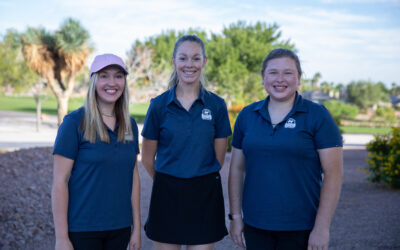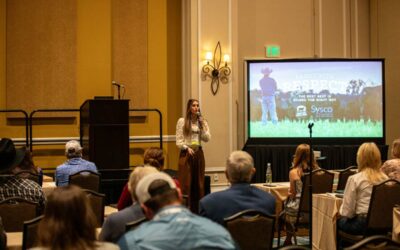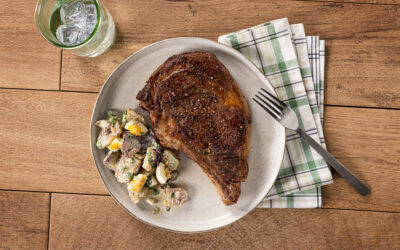
Jerry & Mike to the rescue
2016 Impact award for CAB recalls 1978-79 fight to reinstate
by Steve Suther
Thirty-eight years after the Certified Angus Beef ® (CAB®) brand’s first sale drew so much press that USDA canceled what it had just approved, the brand was honored with the Don L. Good Impact Award from Kansas State University (K-State).
The Ohio-based company reopened six months after its carcass stamp was confiscated, and went on to sell more than a billion pounds in 2016. Why did a K-State award single out CAB? Because it exemplifies “game changer” impact, and many people in its history hold degrees from the University.
CAB President John Stika introduced several current and former staff at the K-State Animal Sciences and Industry Family & Friends Reunion Oct. 7, but only two of those never actually worked for the brand. They are part of “the rest of the story.”
Michigan native Jerry Lipsey is best known as a longtime CEO of the American Simmental Association, and spent nearly as long prior to that as a meat science professor at the University of Missouri (MU). Next to him in photos that evening is Oklahoma native Mike May, a retired USDA Standardization Branch Chief. Both earned doctorates from K-State, but their CAB connections are not well known.
“You want to hear a story?” the ever-energetic Lipsey asks. Before joining the MU faculty, he started his career in 1978 as Director of Junior Activities for the American Angus Association and ramped up the focus on the carcass side. The Association’s Executive Director C.K. Allen was new that year, too.
“One morning in early November, I get to work and C.K. said he wanted to meet with me, to come to his office at 10 o’clock,” Lipsey recalls.
CAB was cancelled on Nov. 1, 1978, just two weeks after that first pound was sold at Renzetti’s IGA in Columbus, Ohio. Almost nobody knew about that the week it happened.

“I walked into [Allen’s] office at 10 and said you know, we’ve got these things coming up, there’s an education seminar and an internship—but he waived me off and said that’s not why you’re here,” Lipsey goes on. “Then he said to come back at 1 o’clock.”
The Angus youth director worried through the rest of the morning and had little appetite for lunch.
“I thought I was ready for anything, but when I walked back into C.K.’s office at 1, there stood Mick Colvin and Fred Johnson [CAB leaders from Ohio],” Lipsey says, his eyebrows recalling the shock. They asked if he ever bought bread in the grocery store and if he recalled the brands. He did. They asked if he ever wondered why beef wasn’t branded.
“I was kind of bewildered at first, but then we talked about CAB and what was going on with USDA and the cancellation,” Lipsey says. “Did I know Mike May, the new Chief of Standardization? Yes, because we were at K-State getting our PhDs in meat science at the same time. They decided I should come to Washington with them the next week.”
May stands by his old friend at the K-State event these many years later and joins in the story.
“You have to remember this was shortly after the grading changes, and a big reason behind CAB coming in then,” May says. “Jerry called me and asked—”
“I asked how or if USDA certified any meat at the time,” Lipsey’s flashback chimes in, “and didn’t that call for cooperation between the Standardization and Grading branches?”
“I said we certified meat as acceptable for the military,” May continues. “We wrote the specifications and Grading carried out the program. You see, Mick [Colvin] had worked with Bob VanStavern at Ohio State and they had some good ideas. They asked us if their program would work and I said yes, it will be a great product.”

USDA is big, and not everybody got the memo on CAB. Those who did had mixed opinions.
“You had to identify live animals and carry that through to the carcass, and Inspection raised that concern,” May says. “But I said they have a workable plan. I said, look, USDA has been beat up over flattening the Choice grade and this will be good for the industry.”
He admitted to a little “salesmanship with our superiors at USDA.”
One of those was Carol Tucker-Foreman, Assistant Secretary for Food and Consumer Services, widely credited with pulling the plug on CAB at the time, though not a matter of record.
“Going to Washington,” Lipsey says, “I thought we would be well-received.” Waiting in Tucker-Foreman’s office however, he began to wonder. Then she walked in.
“I think you’re deceiving consumers and I’m not going to stand for it,” Lipsey recalls her saying. “She didn’t ask for any input or ask us any questions. It was an extremely brief meeting.”
But there were other meetings with May as an ally, to go with the many letters Allen, Colvin and Johnson wrote. Congress weighed in after hearing from constituents.
“I can’t tell you how we finally convinced the assistant secretary, as she thought Inspection should have no role in marketing,” May says. “I told her their role is, they are the only branch that could take on that role. Somebody well above me got through to her.”
Stika summarized: “The argument that USDA had a legal obligation to help producers monitor the brand’s implementation was accepted.”
Six months to the day after the first pound of CAB sold, the brand was open for business again. That week in April, 1979, new doors opened in Columbia, Mo., too, where Lipsey was interviewing for a staff position at MU. He was at Diggs Packing there when it signed on as the second licensed processor, and at Eastlake IGA in town when it became the first retailer west of the Mississippi to sell CAB.
In remarks while accepting the Impact award, Stika noted CAB has no cattle or beef, just a logo licensed for use by its 18,000 partners on behalf of Angus producers.
“If an organization that only owns this can be recognized for having an impact, then obviously it’s because of the sum of its parts, the collection of people working together,” he said. “This is a celebration of an opportunity to bring an industry together focused on one thing, and that’s on delivering quality to consumers worldwide.”
You may also like
$100,000 Up for Grabs with 2024 Colvin Scholarships
Certified Angus Beef is offering $100,000 in scholarships for agricultural college students through the 2024 Colvin Scholarship Fund. Aspiring students passionate about agriculture and innovation, who live in the U.S. or Canada, are encouraged to apply before the April 30 deadline. With the Colvin Scholarship Fund honoring Louis M. “Mick” Colvin’s legacy, Certified Angus Beef continues its commitment to cultivating future leaders in the beef industry.
Raised with Respect™ Cattle Care Campaign Launched This Fall
Raised with Respect™ was developed as part of a strategic cattle care partnership between Sysco and CAB. The collaboration focuses on supporting farmers and ranchers, equipping them with continuing education to stay current on best management practices and helping to increase consumer confidence in beef production.
Certified Angus Beef Celebrates 45th Year with Strong Sales
It has been 45 years since Certified Angus Beef’s first customer purchased a strip steak at Renzetti’s IGA grocery store. Since then, consumer demand for high-quality beef has grown, ultimately driving demand for premium Angus genetics.



